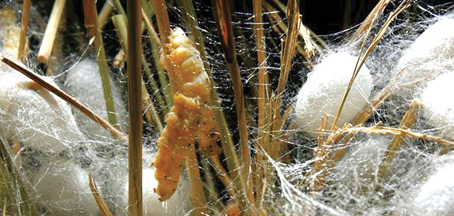Silk could soon be used in medical implants instead of metal alloys
Silk minimises the pain involved in having implants
for broken bones:
In a medical breakthrough that could be straight from the pages of a
fairy tale, scientists have made steps towards replacing metal implants
used to mend broken bones with screws spun by silkworms. The metal
alloys currently used to make plates and screws sometimes hinder the
healing process, as they can corrode in a patient's body, are sensitive
to heat, and often need to be surgically removed.
Clinicians
While clinicians have used silk in bandages and medical textiles for
years, scientists have now proven in animal trials that silk screws
could save patients pain and discomfort by offering a better healing
process.
|

Silkworms spin cocoons among straws in a silk farm in China. |
This is because the fastenings as are easier to implant in the body,
and fit better into the bone.
As the fibres silkworms produce are as strong as steel
weight-for-weight, the strength and durability offered by metal alloy
implants won't be lost.
Screws
The screws are also 'biocompatible', meaning the proteins in silk
closely resemble those present in the human body.
Silk screws are therefore absorbed as the patient heals, saving them
from having further operations and making it less likely the area will
become swollen and irritated. "The silk screws remained in the bone for
up to eight weeks before gradually being reabsorbed by the body,
eliminating the need for surgical removal.
And since silk is invisible on X-ray radiographs, the screws don't
obstruct doctors' views of the healing process around the wound," reads
the paper published in the Nature Communications journal by US
scientists from Tufts University and the Harvard Medical School.
Meanwhile, other teams of scientists are attempting to make it easier
to produce the silk itself, by moving away from relying on sometimes
unpredictable insects.
By reproducing the fibres using other methods, researchers can
eradicate problems including silk-producing spiders attempting to eat
each other rather than spin, according the USA Today.
German company AMSilk, a finalist in last year's Ernst and Young's
Entrepreneur of the Year competition, has successfully genetically
modified a harmless strain of E. coli bacterium so they create spider
silk protein.
The silk has so far been used in silicone breast implants. The silk
coating shielded implants from immune attack, which often triggers
scarring, swelling and other side effects, according to the newspaper.
- The Independent |

